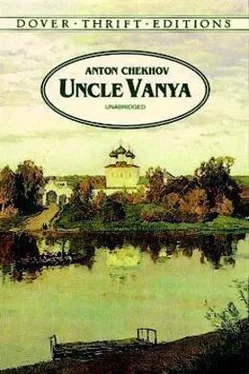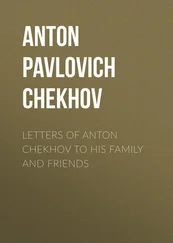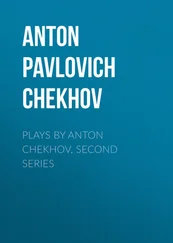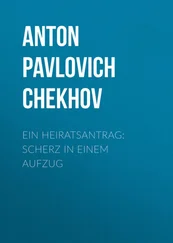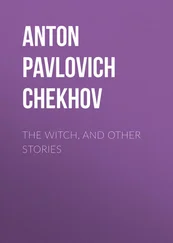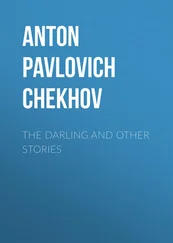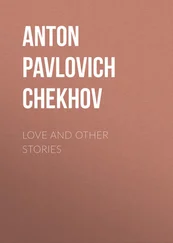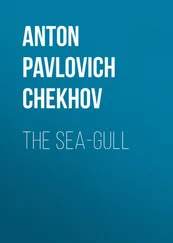Anton Chekhov - Uncle Vanya
Здесь есть возможность читать онлайн «Anton Chekhov - Uncle Vanya» весь текст электронной книги совершенно бесплатно (целиком полную версию без сокращений). В некоторых случаях можно слушать аудио, скачать через торрент в формате fb2 и присутствует краткое содержание. Год выпуска: 2014, Издательство: epubBooks Classics, Жанр: Драматургия, на английском языке. Описание произведения, (предисловие) а так же отзывы посетителей доступны на портале библиотеки ЛибКат.
- Название:Uncle Vanya
- Автор:
- Издательство:epubBooks Classics
- Жанр:
- Год:2014
- ISBN:нет данных
- Рейтинг книги:4 / 5. Голосов: 1
-
Избранное:Добавить в избранное
- Отзывы:
-
Ваша оценка:
- 80
- 1
- 2
- 3
- 4
- 5
Uncle Vanya: краткое содержание, описание и аннотация
Предлагаем к чтению аннотацию, описание, краткое содержание или предисловие (зависит от того, что написал сам автор книги «Uncle Vanya»). Если вы не нашли необходимую информацию о книге — напишите в комментариях, мы постараемся отыскать её.
Uncle Vanya — читать онлайн бесплатно полную книгу (весь текст) целиком
Ниже представлен текст книги, разбитый по страницам. Система сохранения места последней прочитанной страницы, позволяет с удобством читать онлайн бесплатно книгу «Uncle Vanya», без необходимости каждый раз заново искать на чём Вы остановились. Поставьте закладку, и сможете в любой момент перейти на страницу, на которой закончили чтение.
Интервал:
Закладка:
SONIA. Autumn roses, beautiful, sorrowful roses!
[She and HELENA stand looking out of the window.]
HELENA. September already! How shall we live through the long winter here? [A pause] Where is the doctor?
SONIA. He is writing in Uncle Vanya's room. I am glad Uncle Vanya has gone out, I want to talk to you about something.
HELENA. About what?
SONIA. About what?
[She lays her head on HELENA'S breast.]
HELENA. [Stroking her hair] There, there, that will do. Don't, Sonia.
SONIA. I am ugly!
HELENA. You have lovely hair.
SONIA. Don't say that! [She turns to look at herself in the glass] No, when a woman is ugly they always say she has beautiful hair or eyes. I have loved him now for six years, I have loved him more than one loves one's mother. I seem to hear him beside me every moment of the day. I feel the pressure of his hand on mine. If I look up, I seem to see him coming, and as you see, I run to you to talk of him. He is here every day now, but he never looks at me, he does not notice my presence. It is agony. I have absolutely no hope, no, no hope. Oh, my God! Give me strength to endure. I prayed all last night. I often go up to him and speak to him and look into his eyes. My pride is gone. I am not mistress of myself. Yesterday I told Uncle Vanya I couldn't control myself, and all the servants know it. Every one knows that I love him.
HELENA. Does he?
SONIA. No, he never notices me.
HELENA. [Thoughtfully] He is a strange man. Listen, Sonia, will you allow me to speak to him? I shall be careful, only hint. [A pause] Really, to be in uncertainty all these years! Let me do it!
SONIA nods an affirmative.
HELENA. Splendid! It will be easy to find out whether he loves you or not. Don't be ashamed, sweetheart, don't worry. I shall be careful; he will not notice a thing. We only want to find out whether it is yes or no, don't we? [A pause] And if it is no, then he must keep away from here, is that so?
SONIA nods.
HELENA. It will be easier not to see him any more. We won't put off the examination an instant. He said he had a sketch to show me. Go and tell him at once that I want to see him.
SONIA. [In great excitement] Will you tell me the whole truth?
HELENA. Of course I will. I am sure that no matter what it is, it will be easier for you to bear than this uncertainty. Trust to me, dearest.
SONIA. Yes, yes. I shall say that you want to see his sketch. [She starts out, but stops near the door and looks back] No, it is better not to know—and yet—there may be hope.
HELENA. What do you say?
SONIA. Nothing. [She goes out.]
HELENA. [Alone] There is no greater sorrow than to know another's secret when you cannot help them. [In deep thought] He is obviously not in love with her, but why shouldn't he marry her? She is not pretty, but she is so clever and pure and good, she would make a splendid wife for a country doctor of his years. [A pause] I can understand how the poor child feels. She lives here in this desperate loneliness with no one around her except these colourless shadows that go mooning about talking nonsense and knowing nothing except that they eat, drink, and sleep. Among them appears from time to time this Dr. Astroff, so different, so handsome, so interesting, so charming. It is like seeing the moon rise on a dark night. Oh, to surrender oneself to his embrace! To lose oneself in his arms! I am a little in love with him myself! Yes, I am lonely without him, and when I think of him I smile. That Uncle Vanya says I have the blood of a Nixey in my veins: "Give rein to your nature for once in your life!" Perhaps it is right that I should. Oh, to be free as a bird, to fly away from all your sleepy faces and your talk and forget that you have existed at all! But I am a coward, I am afraid; my conscience torments me. He comes here every day now. I can guess why, and feel guilty already; I should like to fall on my knees at Sonia's feet and beg her forgiveness, and weep.
ASTROFF comes in carrying a portfolio.
ASTROFF. How do you do? [Shakes hands with her] Do you want to see my sketch?
HELENA. Yes, you promised to show me what you had been doing. Have you time now?
ASTROFF. Of course I have!
He lays the portfolio on the table, takes out the sketch and fastens it to the table with thumb–tacks.
ASTROFF. Where were you born?
HELENA. [Helping him] In St. Petersburg.
ASTROFF. And educated?
HELENA. At the Conservatory there.
ASTROFF. You don't find this life very interesting, I dare say?
HELENA. Oh, why not? It is true I don't know the country very well, but I have read a great deal about it.
ASTROFF. I have my own desk there in Ivan's room. When I am absolutely too exhausted to go on I drop everything and rush over here to forget myself in this work for an hour or two. Ivan and Miss Sonia sit rattling at their counting–boards, the cricket chirps, and I sit beside them and paint, feeling warm and peaceful. But I don't permit myself this luxury very often, only once a month. [Pointing to the picture] Look there! That is a map of our country as it was fifty years ago. The green tints, both dark and light, represent forests. Half the map, as you see, is covered with it. Where the green is striped with red the forests were inhabited by elk and wild goats. Here on this lake, lived great flocks of swans and geese and ducks; as the old men say, there was a power of birds of every kind. Now they have vanished like a cloud. Beside the hamlets and villages, you see, I have dotted down here and there the various settlements, farms, hermit's caves, and water–mills. This country carried a great many cattle and horses, as you can see by the quantity of blue paint. For instance, see how thickly it lies in this part; there were great herds of them here, an average of three horses to every house. [A pause] Now, look lower down. This is the country as it was twenty–five years ago. Only a third of the map is green now with forests. There are no goats left and no elk. The blue paint is lighter, and so on, and so on. Now we come to the third part; our country as it appears to–day. We still see spots of green, but not much. The elk, the swans, the black–cock have disappeared. It is, on the whole, the picture of a regular and slow decline which it will evidently only take about ten or fifteen more years to complete. You may perhaps object that it is the march of progress, that the old order must give place to the new, and you might be right if roads had been run through these ruined woods, or if factories and schools had taken their place. The people then would have become better educated and healthier and richer, but as it is, we have nothing of the sort. We have the same swamps and mosquitoes; the same disease and want; the typhoid, the diphtheria, the burning villages. We are confronted by the degradation of our country, brought on by the fierce struggle for existence of the human race. It is the consequence of the ignorance and unconsciousness of starving, shivering, sick humanity that, to save its children, instinctively snatches at everything that can warm it and still its hunger. So it destroys everything it can lay its hands on, without a thought for the morrow. And almost everything has gone, and nothing has been created to take its place. [Coldly] But I see by your face that I am not interesting you.
HELENA. I know so little about such things!
ASTROFF. There is nothing to know. It simply isn't interesting, that's all.
HELENA. Frankly, my thoughts were elsewhere. Forgive me! I want to submit you to a little examination, but I am embarrassed and don't know how to begin.
ASTROFF. An examination?
HELENA. Yes, but quite an innocent one. Sit down. [They sit down] It is about a certain young girl I know. Let us discuss it like honest people, like friends, and then forget what has passed between us, shall we?
Читать дальшеИнтервал:
Закладка:
Похожие книги на «Uncle Vanya»
Представляем Вашему вниманию похожие книги на «Uncle Vanya» списком для выбора. Мы отобрали схожую по названию и смыслу литературу в надежде предоставить читателям больше вариантов отыскать новые, интересные, ещё непрочитанные произведения.
Обсуждение, отзывы о книге «Uncle Vanya» и просто собственные мнения читателей. Оставьте ваши комментарии, напишите, что Вы думаете о произведении, его смысле или главных героях. Укажите что конкретно понравилось, а что нет, и почему Вы так считаете.
